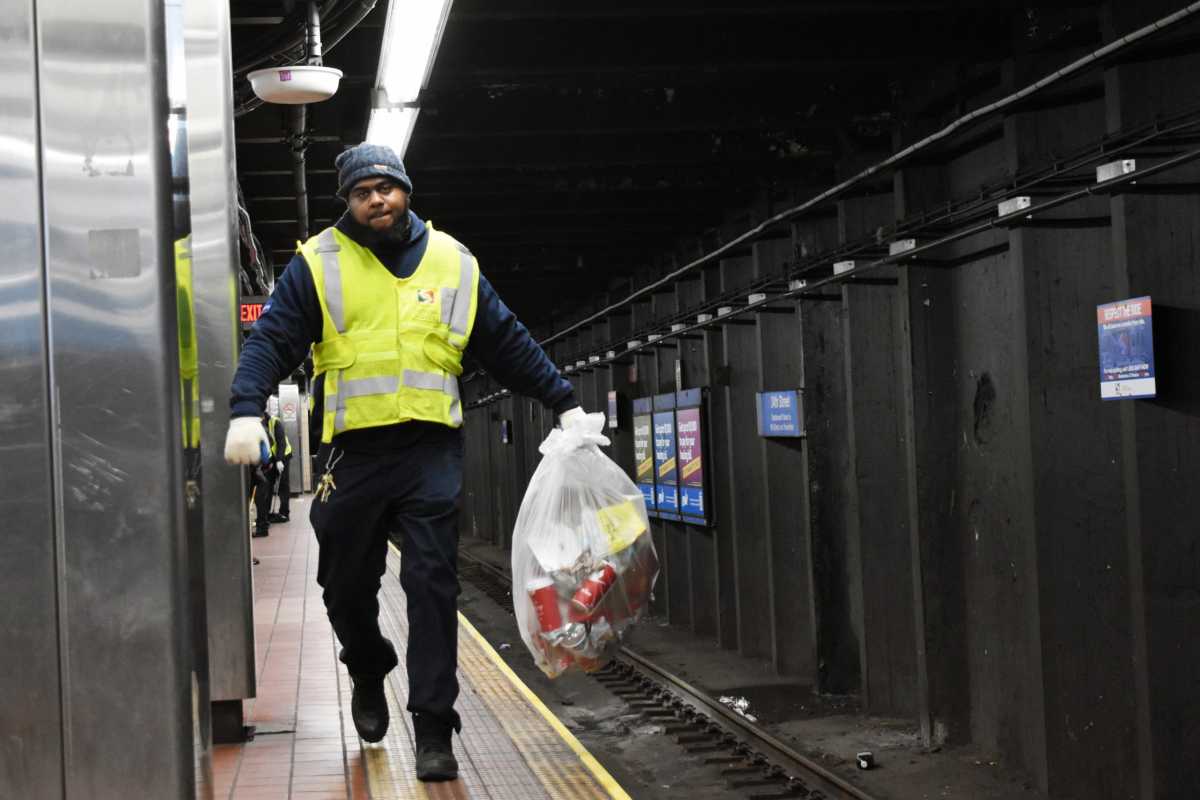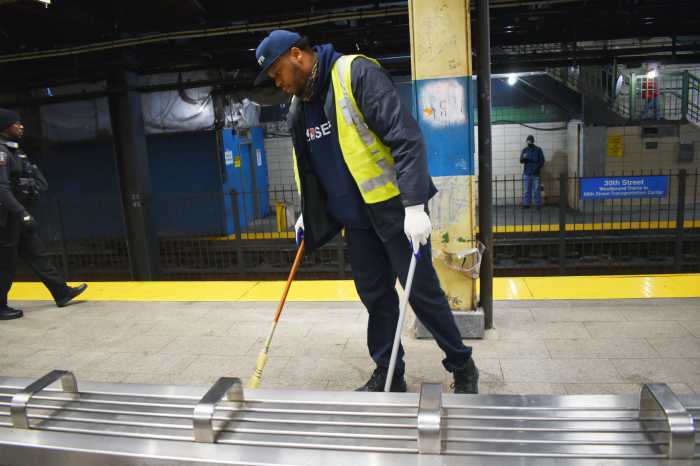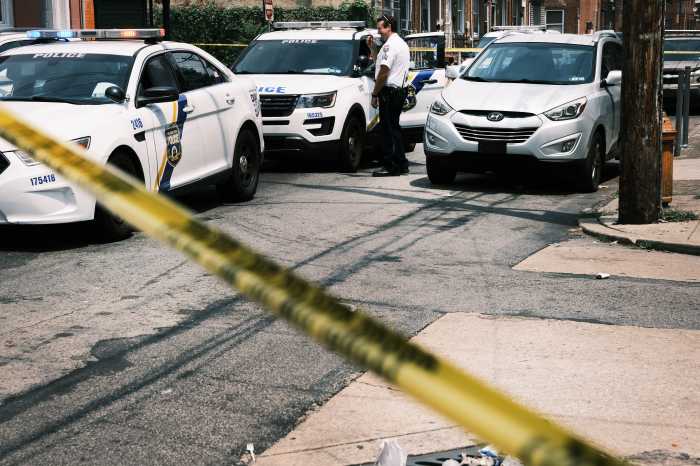A cold rain fell as Judrol Corke mopped the elevator at Market-Frankford Line’s 46th Street Station in West Philadelphia.
“Sometimes, there’s urine. There’s feces,” Corke, a 41-year-old SEPTA custodian, said. “Handicapped people use this elevator. When they come on, we want to have it presentable in a certain way for them.”
Metro recently shadowed a Market-Frankford Line cleaning crew for part of their shift to learn about the challenges of keeping “the el” – SEPTA’s busiest service and, perhaps, its dirtiest – clean.
Corke, who goes by Jude, leads a team of four or five custodians in charge of cleaning four stops, from 46th Street to 30th Street. Hopping from station to station on the train, they sweep litter off the platforms, sanitize turnstiles, wipe off graffiti, and empty the trash, among other duties.
Chris Herron, 33, a SEPTA cleaner who lives in West Philadelphia, said they learn the spots at each station where people urinate and defecate.
“You talk about being in the line of duty,” Sylvester Henry, another member of the team, said as he swept up a needle at 30th Street.
Henry said he cleans up needles every day, an indicator of the opioid epidemic’s impact on the MFL. Many more are piled in the track area – which is periodically cleared by another SEPTA department.
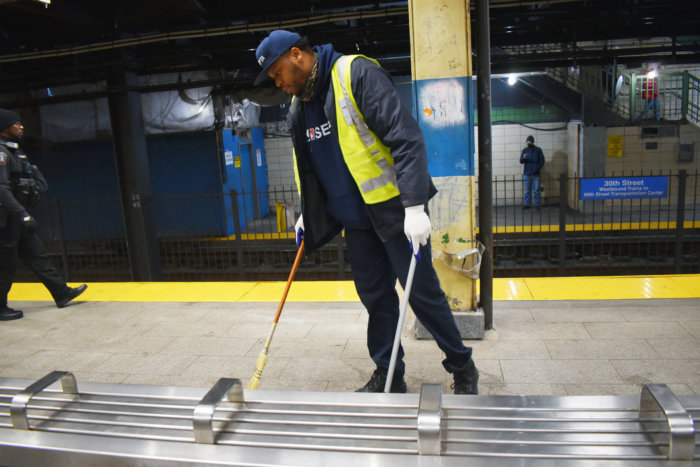
Another sector of the agency is in charge of cleaning the subway cars themselves. It takes a lot of different people to keep the service as clean as it is, said supervisor Rachel Allen, who oversees the custodial crews on the western section of the line.
“We do our best,” she said. “We’re dealt some nasty hands at times, but we do our best.”
Each station has its own intricacies. Corke’s crew is exposed to the elements at 46th Street, which is elevated, before moving to other stops underground.
There’s a Wawa near 34th Street, so spilled coffee is often a problem, and construction at 30th Street means more dust is floating around.
At 34th, the team has a small office and storage room that smells strongly of bleach, which they utilize for cleaning human waste.
The custodians use less harsh cleaners for sanitizing turnstiles and Key card machines. Previously, they wiped those areas once a shift, but, since the coronavirus pandemic, they sanitize twice.
For graffiti, the crew turns to a chemical they call “gat,” which is remarkably effective at getting the scribblings off benches and other surfaces. Anything they can’t remove is referred to a painting team.
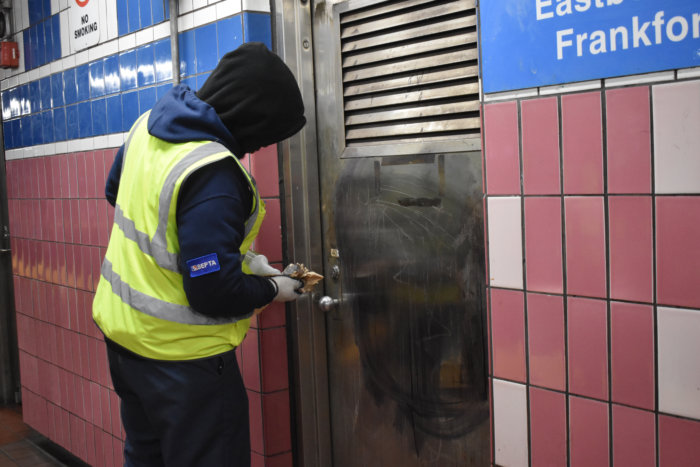
Riders can report specific sanitation and cleanliness issues to 215-580-7800, and the authority’s customer service team contacts a supervisor, such as Allen, who alerts the custodians.
SEPTA employs more than 260 platform cleaners on the Market-Frankford and Broad Street lines, and it’s a 24-hour operation.
Corke’s crew clocks in at 5 a.m., and another team comes in to relieve them at 1:30 p.m. An overnight shift, which uses heavier washing equipment, works 9:30 p.m. to 6 a.m.
Allen will contact Corke in the morning to see what they have observed so far. Their team notifies SEPTA transit police, she said, if they encounter a homeless person, drug user or other vulnerable person inside a station.
She advises custodians to leave the area and alert the authority’s police force if they witness a heated argument or fight.
“We have to keep in mind that it’s still part of the streets,” Allen said. “We don’t know what they’re capable of.”
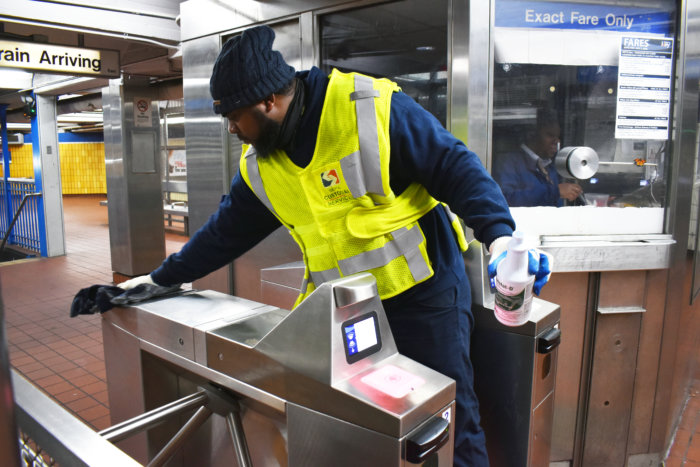
The average pay for a custodian is $23 an hour, a SEPTA spokesperson told Metro, along with an enviable benefits package. They are members of Transport Workers Local 234, a powerful union that, historically, has not hesitated to strike if negotiations falter.
Employees of SEPTA can also transfer internally if they are interested in taking on another role. Corke, who lives in Upper Darby and speaks with a slight Trinidadian accent, is currently eyeing a supervisor job.
Corke, a father of two, immigrated from the Caribbean as a teenager in the 1990s, settling first in New York and then Philadelphia. He began working for SEPTA six years ago.
“The job is challenging,” he said. “But it takes care of me and my family, so I’ve fallen in love with the job.”




